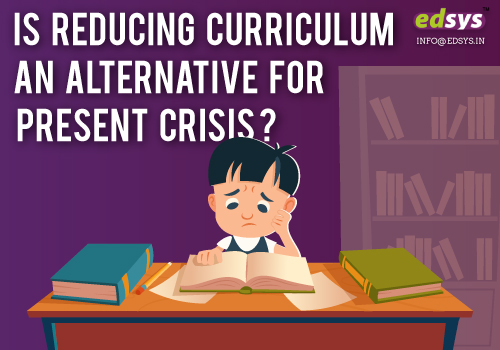All of us are passing through a hectic time as things have changed in a flash.
Delay in academics to begin, no school re-opening day celebrations, no class gathering, and classes have been moved to online as a whole.
Even though these changes are indigestible for many but moving with the trend is the only thing that works finely.
As a result of all these scenarios, most of the school boards have come up with the option to reduce the syllabus. Do you think it can really benefit students?
Let’s see what are the consequences to be faced if syllabus is reduced or curriculum is shortened.
As we are already aware of the fact that, a majority of the 21st-century kids do lack general knowledge and are unaware of the basic things.
Why is it so?
In a single click away!
A simple click can help them to know from something as small as a ‘nail’ to something as large as an ‘airplane’, Relying on internet has reduced the intelligent quotient and brain usage of most of the students.
Many people have come up with the idea of reducing syllabi as they find online classes to be difficult and topics are not being covered up.
Reduction of syllabi and school hours is not a good idea as it will affect students preparing for competitive exams and their future prospects.
According to students, reducing the syllabus will not prove to be the right solution. Because it can affect them wildly in their long run.
The boards and education minister have come up with this in order not to pressurize students. The ministry is of the opinion to give maximum time for students to prepare for the exam and also to make use of online classes and digital notes available.
According to CBSE boards, the key features of the reduced syllabus will be
- Retaining the core elements of syllabus, other duplicate chapters will be removed
- Education will revolve around learning outcomes and competency-based education rather than exam-based learning
- In the coming years, 20% questions will have connection to real-life situations
- Students need to adapt to the present-day education system because a simultaneous change is required in this scenario.
So, we have seen that reducing the syllabus is not a good idea, but we need to bring new methods of teaching and learning.
What happens if the Curriculum as a Whole is Reduced?
- It can affect the students preparing for competitive exams
- Students get promoted to the next grade with partial knowledge
- Can reduce the brain utilization of students
So, What is the Alternative?
Changes in teaching methods can be appreciated. Teachers can make the learning process interactive and engaging.
One of the things that can work out well is giving proper feedback. Students can be asked to attend tests frequently and teachers should give them timely feedback. This process can enrich the learning process to an extent.
One of the other things that can be done is Self-learning.
In curriculum, some topics can be segregated for self-learning, wherein the students can be asked to study those portions on their own. This can also be a relief for teachers to an extent as it can reduce their burden.
In colleges, teachers just play a role in guiding them with the curriculum, and the note-making and learning part is left completely for the students to understand. So, self-learning from a tender age will let students be familiar with the trend.
So, this would be of great help to them in the future.
What we can offer?
Students can be asked to do assignments and projects, once the lessons are completed.
But can teachers own time for all these during this crucial time?
Edsys for Education presents ‘Assignment Management System” and “Assessment Management System” to engage students to carry out test and task in a systematic way.
Teachers can make use of the Assignment and Assessment Management System to make this process interesting and collaborative.
Here teachers can assign assignments to students easily, as we have a handful of added questions to this.
For assessments also, teachers can select the questions and assign them to students easily.
One of the major highlight of this is, proper feedback from teachers can be conveyed to students in no time.
Self-learning is also possible in this system; students can attend the tests and can assess themselves.
Things would have a colorful ending only if we embrace innovations and technological advancements bravely.
I hope these features can help to cope with this present scenario, without reducing the curriculum or syllabi.


